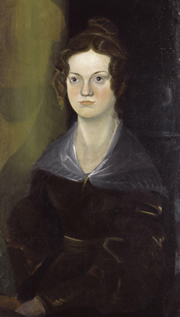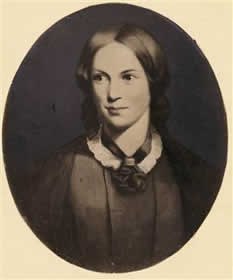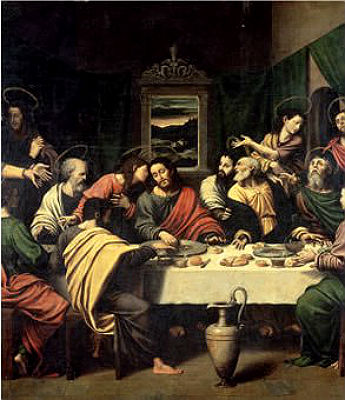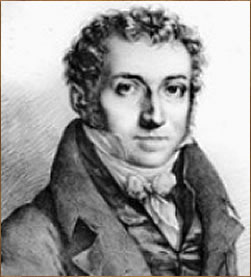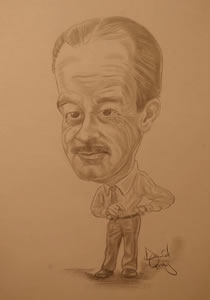De Britse schrijfster Charlotte Brontë werd geboren in Thornton op 21 april 1816. Zie ook alle tags voor Charlotte Brontë op dit blog.
Uit: Shirley
“Yet even in those days of scarcity there were curates: the precious plant was rare, but it might be found. A certain favoured district in the West Riding of Yorkshire could boast three rods of Aaron blossoming within a circuit of twenty miles. You shall see them, reader. Step into this neat garden-house on the skirts of Whinbury, walk forward into the little parlour–there they are at dinner. Allow me to introduce them to you:–Mr. Donne, curate of Whinbury; Mr. Malone, curate of Briarfield; Mr. Sweeting, curate of Nunnely. These are Mr. Donne’s lodgings, being the habitation of one John Gale, a small clothier. Mr. Donne has kindly invited his brethren to regale with him. You and I will join the party, see what is to be seen, and hear what is to be heard. At present, however, they are only eating; and while they eat we will talk aside.
These gentlemen are in the bloom of youth; they possess all the activity of that interesting age–an activity which their moping old vicars would fain turn into the channel of their pastoral duties, often expressing a wish to see it expended in a diligent superintendence of the schools, and in frequent visits to the sick of their respective parishes. But the youthful Levites feel this to be dull work; they prefer lavishing their energies on a course of proceeding, which, though to other eyes it appear more heavy with ennui, more cursed with monotony, than the toil of the weaver at his loom, seems to yield them an unfailing supply of enjoyment and occupation.”

Charlotte Brontë (21 april 1816 – 31 maart 1855)
Portret door Evert A. Duyckinck
De Franse schrijver Patrick Rambaud werd geboren op 21 april 1946 in Parijs. Zie ook alle tags voor Patrick Rambaud op dit blog.
Uit: Chronique du règne de Nicolas Ier
“Le petit marquis de Benamou possédait la science des courbes et parvenait à enjôler. Il fut cependant confiné dans une annexe du Château, face aux appartements privés en réfection, de l’autre côté de la rue. Aussitôt posé, il gonfla ses plumes et bomba son bréchet à la façon des dindonneaux. Il couvrit de médailles et de rubans l’acteur et le réalisateur d’un film tiré de son ouvrage sur le défunt monarque qu’il avait adulé en nécrophage, puis, dans la foulée, dix journalistes convenables aux yeux du Prince puisqu’ils passaient fort bien
le cirage et la brosse. Notre petit marquis savait, pour l’éprouver lui-même, que les gens de peu savourent la gloriole sous forme de hochets, autant que les enfants leurs sucreries. Ces cérémonies n’empêchaient pas le petit marquis de progresser dans la goujaterie et le paraître. Il se rendit un jour à l’hôtel Raphaël où il faisait bon se montrer, s’installa de son propre chef à la meilleure table. M. Bertrand, célèbre maître des cocktails, mondialement connu et que saluaient les habitués de l’établissement, osa s’approcher et signifia avec déférence que cette place était réservée depuis le matin à un autre illustre. Quoi? Qu’y avait-il? De quel droit? Notre petit marquis étouffa de colère: ne l’avait-on pas reconnu? Savait-on quel il était? Son rôle influent, sa puissance? Comment osait-on lui demander de changer de fauteuil mou? Comment? Un malotru voulait l’asseoir à la table voisine, qu’il n’avait pas élue? Outrecuidance! Manque de tact! Il lança au visage de M. Bertrand une pleine écuelle de cacahuètes, sortit sur une colère qui résonna dans ces lieux feutrés, menaça de féroces représailles; rentré dans son annexe avec ses gardes du corps qui cachaient leur amusement, il tempêta, cria, se roula sur la moquette et, entre deux hoquets, voua l’insolent barman aux flammes de l’Enfer. »

Patrick Rambaud (Parijs, 21 april 1946)
Onafhankelijk van geboortedagen
De Engelse dichter en vertaler Jamie McKendrick werd geboren in 1955 in Liverpool. Zie ook alle tags voor Jamie McKendrick op dit blog.
Good Hedges
He wants the holly tree cut down to size,
the holly tree where the birds are sound, and safe
from his cat whose snickering impersonation
of birdsong – more like the din a mincer makes –
fools no-one, and charms nothing out of the trees.
He wants us to tidy up the pyracantha sprouting
its fire-thorns and berry-laden fractals, and clip
the brambles, the lilacs, everything wild.
Next he’ll want the hedgehog’s spikes filed down,
the moles claws bound up with green twine
— already he’s replaced his own hair with ginger nylon.
His light he says is being blocked. It’s dark
where he is. He has a point — so many deaths
in these few houses, it’s like something
loosed from the bible. One lucky escape, though:
the bearded roofer, one along, who lost
his footing, high on the scaffolding, and fell,
with his deck of tiles, on his shoulder and skull.
Sometimes tears come to his eyes for no reason
he can think of, but now the sun’s out he sits again
on the patio, plucking from his banjo
some Appalachian strand of evergreen bluegrass
then an Irish reel where his fingers scale
a glittering ladder like a waterfall
so even the songbirds hush in the holly tree.
On/Off
The switch stuck through the lampstand’s neck
like an arrow shaft of walrus ivory
in a Welsh epic
has lost its feathers and its head.
Peacock feathers and a gold head.
Its Fiat Lux
with a length of flex,
its shift, its crick has made me
blink like a lemur at the lack
of the moon or a star
or a thing between. But it’s good
how someone takes off their earrings
with the motion of shelling a pea.
A tiny snap. Like the hasp-click
of a calyx
at the press of a picker’s thumb.
A sound like lifting an airtight lid
or a pin dropping in a pyramid.
Then the lobe’s set free
and breathes with delight
to shed the slight weight
of the earrings.
Earrings that might be twin filaments,
a pair of ball-bearings
or a hammock-faced moon and a tarnished star.
Jamie McKendrick (Liverpool, 1955)
De Engelse schrijver John Mortimer werd geboren op 21 april 1923 in Londen. Hij studeerde aan de Universiteit van Oxford, Brasenose College. Tijdens de Tweede Wereldoorlog schreef hij scenario’s voor draaiboeken voor propagandafilms. In 1948 begon hij te werken als advocaat en ongeveer tegelijkertijd begon hij zijn carrière als schrijver. Hij schreef talrijke romans, korte verhalen, theaterstukken en scenario’s. Mortimers bekendste schepping is de figuur van de excentrieke advocaat Horace Rumpole, die in 1975 voor het eerst verscheen in Rumpole of the Bailey. Rumpoles avonturen werden ongeveer gelijktijdig uitgebracht als kort verhaal en als televisieserie, met de Australische acteur Leo McKern in de titelrol. Na McKerns dood in 2002, kwam er een vervolg met Timothy West. Zie ook mijn blog van 17 januari 2009.
Uit: Rumpole and the Brave New World
“At my age I’m about as far from childhood as it’s possible to be. I’m nearer toppling off the peg than joining in adolescent games, but there was one case which gave me an alarming and, I hope, interesting insight into the world of the youth of today.
It began when one of Hilda’s innumerable relatives, her niece Cynthia, a student at Oxford, was taking part in a performance of The Messiah and sent an invitation to Hilda saying that she wished we would both come. Naturally I did my best to have an important legal fixture on the date specified, but work was as plentiful as Manhattan cocktails in the desert. When I told Hilda that my practice was more important than the concert she went down to my chambers and checked up with Henry, my clerk, in the most treacherous manner. I was therefore condemned to the oratorio. So I was to be found on that particular Thursday, not in number one court in the Old Bailey, or even before the Snaresbrook magistrate, but in the vast auditorium which is the Sheldonian theatre in Oxford. It was there, many years ago, that I had taken my degree, kneeling and being bumped on the head with a Bible.”
I can remember my days at Keble College as peaceful and untroubled, and I can’t say that I was taught anything that would help me to become known throughout the Temple as one of the deadliest cross-examiners in the trade. Instead, the tutors and lecturers wanted to discuss property laws, the more obscure provisions of banking acts and rights of way.”
John Mortimer (21 april 1923 – 16 januari 2009)
De Columbiaanse dichteres Meira Delmar (eig. Olga Isabel Chams Eljach) werd geboren in Barranquilla op 21 april 1922. Meira del Mar (studeerde muziek aan het conservatorium Pedro Biava van de universiteit van Atlántico en kunstgeschiedenis en literatuur in Rome. Gedurende 36 jaar was zij hoofd van de Biblioteca Pública Departamental del Atlántico. Voor haar werk ontving zij diverse onderscheidingen, zols een eredoctoraat van de universiteit van Atlanticó, het “Simón Bolívar”-ereteken van het ministerie van nationale opvoeding en de nationale prijs voor poëzie.
The flowering tree
Against the blue of the sky – the sky so clean
that seems to be washed by the hands of God –
How well the tree looks , softly inclined
under the rosy weight of his flowering branches!
I see him leaning his forehead on the white panes
of the window; and he reminds me,
all full of flowers, butterflies and trills¸
of a small poem he used to recite . . .
Who knows of the things the moon tells him
when she comes at night to talk with him!
Many a time I’ve seen him ecstatic listening to her
strangely peaceable until dawn comes . . .
And the breeze no longer runs naked through the fields!
He, every morning, when he sees her walk by,
throws such a pretty satin cape
over her shoulder, in a gentle gesture.
We have been, for some time, the best of friends!
And I, who never tell anybody of my secret love,
have let his soul come near to my lips . . .
and have given everything to the good, flowering tree!
Death, in Venice,
they take on a trip
like a bride.
Between two blues
the mournful gondola
glides,
covered by slow velvets,
and you hardly perceive
the light thud
of one dip of an oar and then another.
Slowly, follows
like a floating garden,
the one carrying the farewell
made of roses
from friends.
And the mourners close
the cortège,
that is lost in the sea.
Accompanying them,
with its finger on its lips,
silence.
Not far off, the island waits.
Behind the rosy wall
that encloses it
cypresses ascend, tall
and dark.
Vertaald door Nicolás Suescún
Meira Delmar (21 april 1922 – 18 maart 2009)
De Duitse schrijver Peter Schneider werd geboren in Lübeck op 21 april 1940. Van 1945 tot 1950 woonde hij in Grainau nabij Garmisch-Partenkirchen en daarna in Freiburg im Breisgau. Hij studeerde germanistiek, geschiedenis en filosofie in Freiburg en München. In 1962 ging hij in Berlijn verder studeren. Hij werd een van de woordvoerders van de Berlijnse studentenbeweging. Zijn roman Lenz werd in 1973 een cultboek van teleurgesteld links. Het beschreef het falen van de utopie en de revolte. Naast verhalen schrijft Schneider ook verhalen, hoorspelen en essays.
Uit: Skylla
“Damals, als ich zum ersten Mal auf dem Hügel stand, habe ich mir gewünscht, auf ihm alt zu werden. Jetzt bin ich so alt, wie ich nie werden wollte, und frage mich, was ich mir damals gewünscht habe.
Wenn ich am Nachmittag vom Meer zurückkehre und die Sonne sich dort im Nussbaum fängt, sich in der Baumkrone rot aufbläht und den ganzen Horizont zum Glühen bringt, und dann in ungeheurem Tempo – man kann gerade mal bis zwanzig zählen!
– in dem dunstigen Gewaber zwischen Meer und Himmel verschwindet, ist alles wieder wie am Anfang. Ja, du hast gut gewählt. Mit der gleichen Gewissheit, mit der du die Frau deines Lebens erkannt hast, als du ihr zum ersten Mal begegnet bist, hast du dich für dieses Stück Erde entschieden. Und dann kommen die ersten Enttäuschungen, die kleinen und großen Katastrophen,
die Kompromisse und Betrügereien: die übliche Enttäuschung des Wunsches durch seine Erfüllung. Aber die Euphorie des ersten Blicks, sie stellt sich immer wieder ein. Es ist der schönste Punkt im Umkreis von hundert Quadratkilometern. Hinten die kahlen, elefantengrauen Bergrücken, vorn das ungeheure Meer.
Die Zeit vergeht hier oben anders als in den Städten. Ich sehe die weiß schimmernden Bugwellen, die die Passagierdampfer und Containerschiffe in die Wasserfl äche schneiden, die von hier aus wie blaues, gehämmertes Metall aussieht, und weiß, dass schon vor Jahrtausenden anders geformte Schiffe, von Seeleuten einer anderen Art gelenkt, ähnliche Bugwellen erzeugt haben.
Dort, hinter der Mauer an der Stirnseite des Hügels, mögen vor fünfhundert Jahren Mönche gekniet und ihre Gebete zum Himmel geschickt haben. Womöglich waren sie die letzten, aber ganz sicher nicht die ersten Besiedler des Hügels, denn unter den mittelalterlichen Ruinen kommen römische Mauern zum Vorschein und unter diesen wieder andere, die von noch früheren Generationen zeugen. Vor den Menschen müssen Adler hier gehaust haben.”
Peter Schneider (Lübeck, 21 april 1940)
De Duitse literatuurwetenschapper en musicus Michael Mann werd als jongste kind van Thomas en Katia Mann geboren op 21 april 1919 in München. De familie noemde hem “Bibi”. Vanaf 1933 leefde hij met zijn familie eerst in Zwitserland, daarna in de VS. Hij trouwde in 1939 met de Zwitserse Grete Moser. Het echtpaar had twee zonen, Frido en Tony, en een adoptiefdochter Raju. Michael Mann studeerde in Zürich, Parijs en New York viool en altviool en was tussen 1942 en 1947 verbonden aan het symfonieorkest van San Francisco. In 1951 ging hij met de pianiste Yaltah Menuhin, zus van Yehudi, op toernee..Deze moest afgebroken worden omdat er geruchten waren over een verhouding tussen de twee. In 1957 besloot Mann zijn viool aan de wilgen te hangen en ging hij aan de universiteit van Harvard germanistiek studeren. Vervolgens was hij van 1964 tot 1977 professor voor Duitse literatuur aan de universiteit van Berkeley. In 1968 ontving hij de Schubart-Literaturpreis.
Uit: Die Tagebücher: Thomas Mann (4 november 1951)
“Yaltas Ehemann betrachtet Biibi als ‘mental case’ und lässt über Fortstzung des ausgedehten Konzertprogramms […] nicht mit sich reden. Die Lage sehr schwierig ohne dass der Zügellose und durch extreme Anstrengungen Überreizte sich schon Rechenschaft davon gäbe. Auch die Frau verängstigt. Ratlosigkeit.
[..] Was soll mit dem jungen Menschen werden, dessen ganze nächste Zukunft auf die Zusammenarbeit mit der ‘sister of’ gestellt war, der es aber, verwildert durch die Huldigungen, die ihm von der Familie Menuhin, selbst von Yehudi, entgegengebracht wurden, unglaublich an Berherrschung hat fehlen lassen. Aber ich redete ihm bei Tische gut zu und sagte, er brache die Verbindung mit Yalta nicht.”
Michael Mann (21 april 1919 – 1 januari 1977)
V.l.n.r.: Michael Mann, Monika Mann, de kleine Frido, Gret Mann, Katia Mann, Thomas Mann
De Franse dichter en schrijver Népomucène Lemercier werd geboren op 21 april 1771 in Parijs. Beroemd werd hij in 1797 met zijn drama Agamemnon. Zijn openhartigheid leverde hem moeilijkheden met Napoleon op toen deze eerste consul was. Het gedenkwaardigste is het filosofische gedicht La Panhypocrisiade, ou la Comédie infernale du XVI. Siècle (in zestien zangen) uit 1819.
La panhypocrisiade (Fragment)
RABELAIS :
C’est Carême-Prenant, que l’orgueil mortifie :
Son peuple, ichtyophage, efflanqué, vaporeux,
A l’oreille qui tinte et l’esprit rêve-creux.
Envisage non loin ces zélés Papimanes,
Qui, sur l’amour divin, sont plus forts que des ânes,
Et qui, béats fervents, engraissés de tous biens,
Rôtissent mainte andouille et maints luthériens.
Ris de la nation des moines gastrolâtres :
Aperçois-tu le dieu dont ils sont idolâtres ?
Ce colosse arrondi, grondant, sourd, et sans yeux,
Premier auteur des arts cultivés sous les cieux,
Seul roi des volontés, tyran des consciences,
Et maî
tre ingénieux de toutes les sciences,
C’est le ventre ! le ventre ! Oui, messire Gaster
Des hommes de tout temps fut le grand magister,
Et toujours se vautra la canaille insensée
Pour ce dieu, dont le trône est la selle percée.
Népomucène Lemercier (20 april 1771 – 7 juni 1840)
